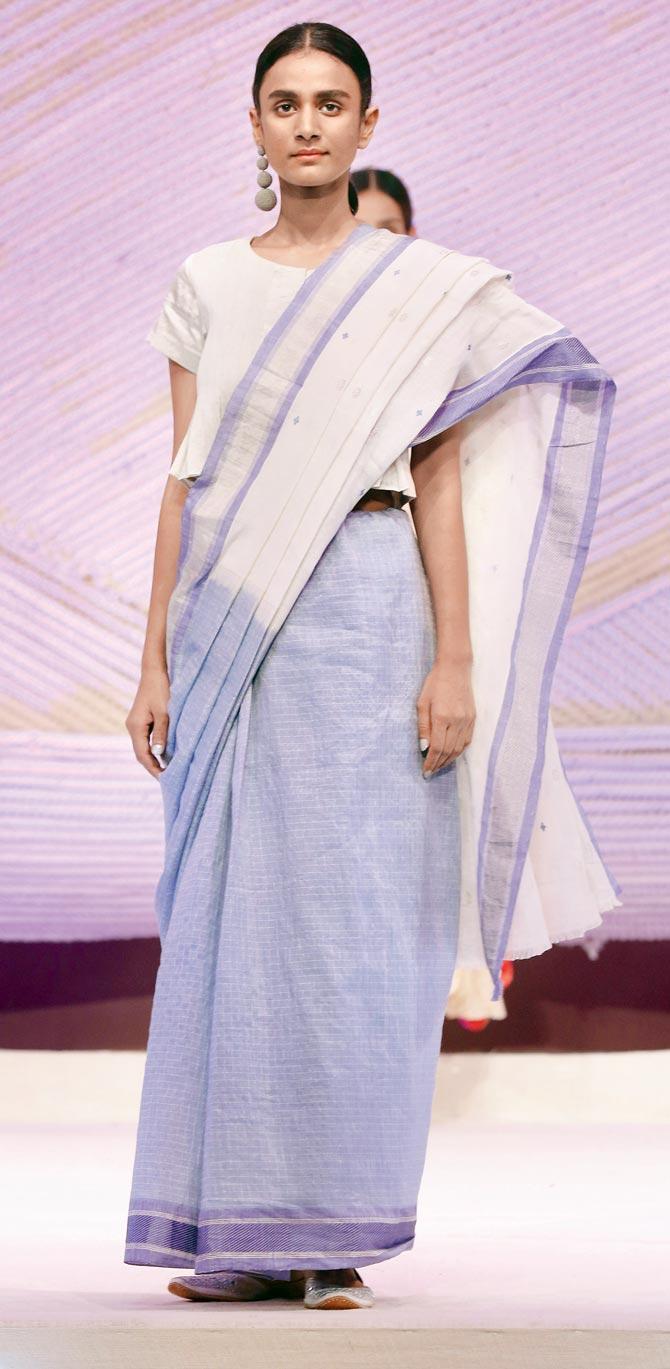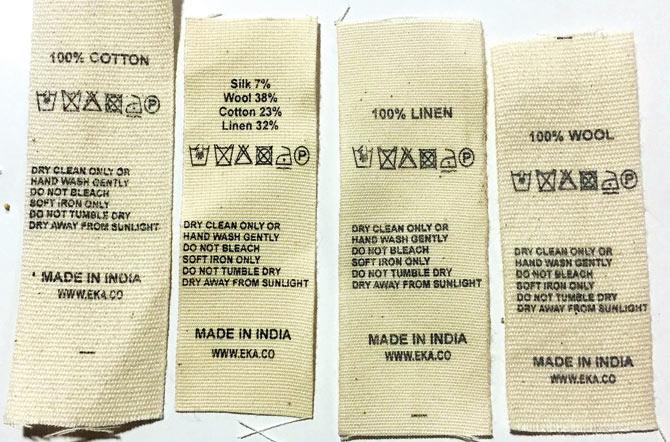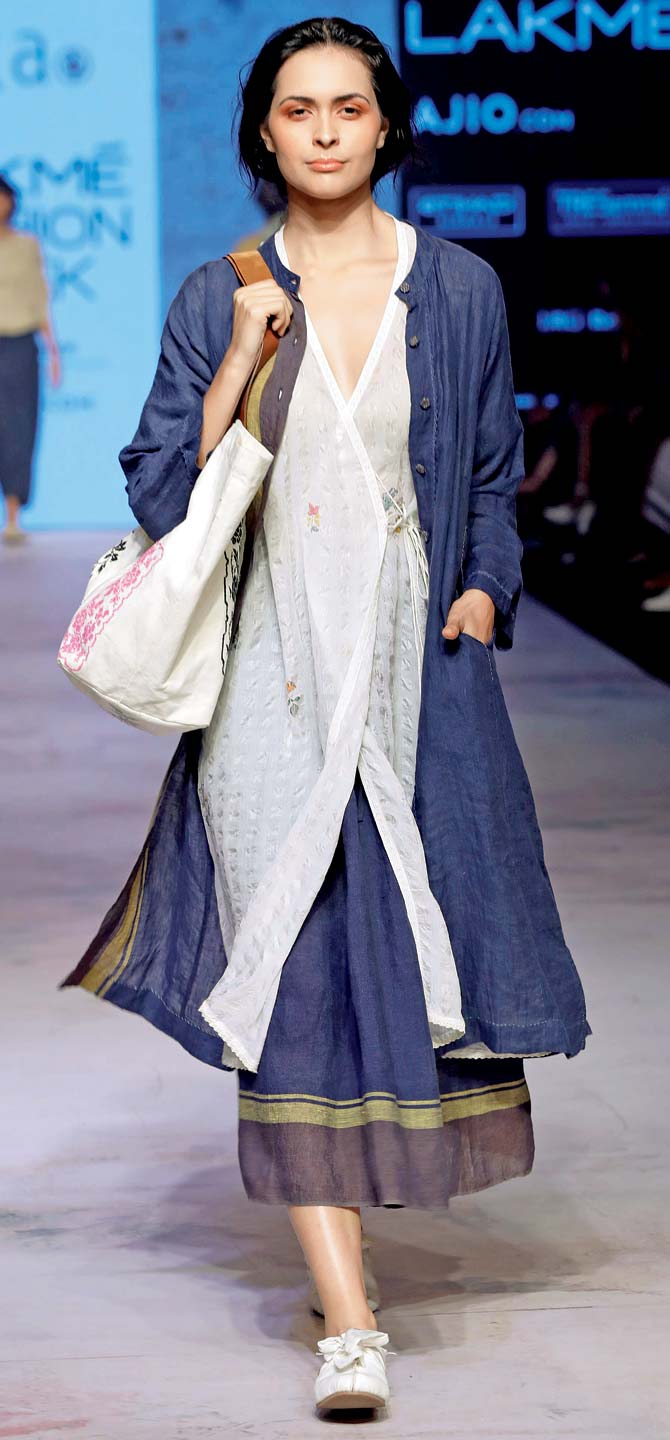Young Indian designers committed to creating more sustainable fashion are racking their brain at research that makes hand-made and hand-wash the perfect couple


Rahul Mishra's Spring/Summer 2017 showcase at Paris Fashion Week last October was hailed for the use of intricate embroideries on organza, which could withstand gentle low temperature washing in a household washing machine. Pic/GETTY IMAGES
Mumbai designer Nimish Shah potters around his Mira Road workshop from where his six-year-old label, Shift, is created. He speaks passionately about his commitment to making fashion more sustainable, with special emphasis given to choice of fabric and pattern cutting that minimises factory waste. But, he is aware that not everything is in his control.
ADVERTISEMENT
"Sustainability is linked to the life of a garment. But, 80 per cent of its life cycle depends on the consumer," he says.
Shah is referring to a dilemma that most Indian fashion enthusiasts, who wish to support ethical fashion, face. While they go to great lengths to choose an ethical label, things may go downhill from there, especially since garment care isn't always sustainable.
"We are not an assembly line, mass-produced label. We work with artisanal textiles and experiment with fusing fabrics. For instance, cotton is used with a silk lining.
So by default, our clothes have to carry the 'dry clean only' tag," Shah says.
Phyllida Jay, anthropologist and expert on contemporary Indian fashion, sustainability and luxury, agrees. She puts the onus on the designer when she says, "It's problematic when everyday clothes come with 'dry clean only' tags. Even the most delicate muslin should be able to withstand a gentle hand-wash in cold water with mild non-sulphate detergent."

Anavila Misra, who works with a cluster in Gadwal, sticks to simple fabrics as the easiest way to ensure sustainable aftercare
Dry cleaning is toxic
Which brings us to the risk that dry cleaning, which most see as an invisible laundry process, poses to the environment. Professional cleaning methods use a liquid chemical solvent called perchloroethylene or perc. Known to be an effective stain eraser without being labour intensive, perc is believed to cause serious health and environmental hazards. America's Environment Protection Agency (EPA) has termed it a toxic air, ground and water pollutant with carcinogenic properties.

For Indian designers like Shah, Rahul Mishra, Rina Singh and Anavila Misra, creating sustainable fashion isn't tokenism. But, while they meet the 'created locally' criteria for a more sustainable fashion line, they have little control once the garment leaves the fashion store.
"Personally, I'd hand-wash my own garments, but we can't monitor how the consumer will act on instructions, making us legally bound if something goes wrong while garments are washed at home. I don't think any designer can claim to be 100 per cent sustainable," admits Shah.

Rina Singh of Eka
Keeping it simple
Keeping clothes simple is one way out. This is ably demonstrated in Misra's hand-woven sarees. Her USP is linen and she is actively involved with a cluster of weavers in Gadwal near Hyderabad. While she creates 90 per cent of her own textiles and takes care against fading pigments and shrinkage, she can't guarantee how temperamental jamdani and zari will react when washed at home. "Dry cleaning is the easiest way of covering yourself against anything that could go wrong," she stresses.

Delhi designer Rina Singh says that although her garments could withstand gentle hand-wash, stores insist on tags carrying the 'dry clean' instruction to reduce liability
Delhi designer Rina Singh's label Eka is textile-driven. She veers towards natural fibres such as wool, cotton, linen and silk. "Anything that I create adheres to the Make in India philosophy," she smiles. To ensure longevity, her garments are treated to two pre-washes at a workshop in Gurgaon. In an ideal world, she says, dry cleaning is not essential. A simple hand-wash in cold water and drying in the shade is sufficient. In fact, since her clothes are not form fitting, she advises against ironing, too. But the aftercare instructions tend to carry the 'dry clean' tag when her garments reach the store. "We have to mention 'dry clean' along with 'hand-wash' because store owners don't want to risk refund or returns. We can't control how the customer will understand instructions, especially when detergent and water temperature come into play."

Rahul Mishra
Jay, points out, that some designers hide behind the handloom label, using it as a crutch for their aesthetic, and/or ethical standpoint. Thereof, the pretty perception that since they are handloom, they are somehow exempt from expectations against shrinkage, leaching of colour, or general deterioration. "It's now intrinsic to marketing to be anti-machine wash, because it's handcrafted, and therefore, delicate. Designers have become lazy about the technical development of fabrics, and don't do sufficient research to create practical textiles," she adds.
Defining the line between decoration and design, recycling versus innovation, Rahul Mishra made us see something new in familiar garments by creating a season-less clothing aesthetic, exploring local craftsmanship and homegrown fabrics.

Now, he is in the mood to expose his buyers and the industry at large, to the myths surrounding dry cleaning. His Spring/Summer 2017 ready-to-wear collection showcased at Paris Fashion Week in October last year received accolades for skilled, almost animate embroideries on organza, which could withstand gentle low temperature washing in a household washing machine. He simplified the process of designer dressmaking by testing threads and fabrics such as hand-woven cotton, viscose, voile, polyester, and surface texturing including 3D motifs. "Funnily, the mention of machine wash devalues the work of a designer in India. But in Paris, the idea was celebrated for its uniqueness," he says.
![Mumbai designer Nimish Shah, who works with artisanal textiles for his label Shift, says he can’t monitor aftercare. "[That makes] us legally bound if something goes wrong while washing garments at home. I don’t think any designer can claim to be 100 per cent sustainable," he says. Pic/Satej Shinde](https://images.mid-day.com/images/images/2017/jul/Nimish-Shah.jpg)
Mumbai designer Nimish Shah, who works with artisanal textiles for his label Shift, says he can't monitor aftercare. "[That makes] us legally bound if something goes wrong while washing garments at home. I don’t think any designer can claim to be 100 per cent sustainable," he says. Pic/Satej Shinde
Mishra plans to continue his exploits by introducing 50 per cent of his collection at the upcoming India Couture Week with machine wash instructions that could be programmed to an eco-friendly wash at 30 degrees. It would be interesting to see couture or occasion wear pieces, otherwise relying on dry cleaning, because of the use of delicate fine lace and fickle needlework, engage with a machine wash. "My brand was also a victim of the oxymoron [sustainable clothes that demand dry cleaning], but after understanding its toxic chemical effects, I want to continue my study into other washing habits," he says.
 Subscribe today by clicking the link and stay updated with the latest news!" Click here!
Subscribe today by clicking the link and stay updated with the latest news!" Click here!







